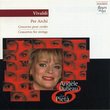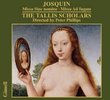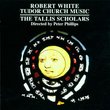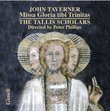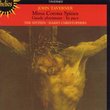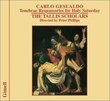| All Artists: John [Composer] Sheppard, John Taverner, Christopher Tye, The Tallis Scholars Title: Taverner, Tye & Sheppard: Western Wind Masses Members Wishing: 1 Total Copies: 0 Label: Gimell UK Release Date: 11/13/2001 Album Type: Import, Original recording reissued Genre: Classical Styles: Opera & Classical Vocal, Historical Periods, Early Music Number of Discs: 1 SwapaCD Credits: 1 Other Editions: Taverner:Western Wind Masses UPC: 755138102729 |
Search - John [Composer] Sheppard, John Taverner, Christopher Tye :: Taverner, Tye & Sheppard: Western Wind Masses
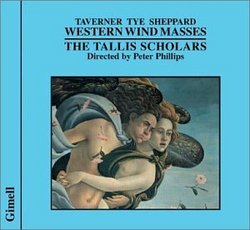 | John [Composer] Sheppard, John Taverner, Christopher Tye Taverner, Tye & Sheppard: Western Wind Masses Genre: Classical
|
Larger Image |
CD DetailsSimilar CDs |
CD ReviewsAs the spirit blows... FrKurt Messick | Bloomington, IN USA | 07/19/2004 (5 out of 5 stars) "--John Taverner, Christopher Tye, and John Sheppard-- Taverner (1490-1545) was an organist and choirmaster at Oxford during Henry VIII's time, appointed to the position by Cardinal Wolsey. A first-rate composer, he composed many masses and other liturgical pieces, all in the Roman Catholic style. He emulated continental habits of taking popular tunes and transforming them into high liturgical art. Despite being listed in Foxe's Book of Martyrs as a heretic, most likely the entry is confusing him with someone else, as Taverner's life centred upon music in the Roman style, and he never seems to have deviated from this.Christopher Tye (1505-1572) was a Cambridge musician and composer, working at King's College part of his career. He was choirmaster of Ely Cathedral, and took doctorates of music from both Oxford and Cambridge. His music includes motets, magnificats, masses, anthems and other liturgical pieces. He finished his career as a parish priest on the isle of Ely.John Sheppard (1515-1559) was the `youngster' of this group. He was more prolific than even Tallis, though his reputation is much less notable now than perhaps it should be. Quite prolific in the Latin liturgical composition, he used pre-existing material to develop his work on more than one occasion. He was granted a degree by Oxford, but perhaps never received it. Reference is made to his study of twenty years at Oxford (and modern doctorate seekers think that their dissertation processes are lengthy!).--Western Wind Masses-- These are unique pieces - not only are they unprecedented in the linkages between three composers on similar pieces, but also these are the only masses in English composition based on a secular tune. The `Western Wynde' masses. Taverner's is generally thought to be the oldest piece, but this view is not without its critics. The styles of the three masses are quite different, so the most Taverner passed on to the others, if indeed his was first, was the idea. Taverner's mass is the most varied; Tye's is more simple, but very stunning, particularly the benedictus. Sheppard's is the shortest of the three, only half the length of Taverner's - it is the most clear and simple of the lot. --Liner Notes-- Being internationally acclaimed, the Tallis Scholars' CDs typically present their commentary and texts in English, French, German and Italian (together with any Latin texts); that is true of this disc. The cover art also typically represents visual arts contemporary with the compositions - here it is detail from `The Birth of Venus', by Botticelli, roughly contemporary with Taverner, the earliest of the three composers featured here. --The Tallis Scholars-- The Tallis Scholars, a favourite group of mine since the first time I heard them decades ago, are a group dedicated to the performance and preservation of the best of this type of music. A choral group of exceptional ability, I have been privileged to see them many times in public, and at almost every performance, their singing seems almost like a spiritual epiphany for me, one that defies explanation in words. Directed by Peter Phillips, the group consists of a small number of male and female singers who have trained themselves well to their task. Their recordings are of a consistent quality that deserve more than five stars; this particular disc of masses by Taverner, Tye and Sheppard deserves a place on the shelf of anyone who loves choral music, liturgical music or Gregorian chant, classical music generally, or religious music. It is a great collection of similarly themed but different pieces. The music on this disc was originally recorded in 1993 at the Church of Sts. Peter and Paul, Salle, Norfolk." Let It Blow! Giordano Bruno | Wherever I am, I am. | 04/29/2009 (5 out of 5 stars) "Choral singing is as British as ale, rugby, or yachting. It's practically genetic. What other country today has produced such a wealth of a capella ensembles: The Sixteen, the Orlando Consort, the Binchois Consort, the Clerks' Group, the Hilliard Ensemble, the Tallis Scholars and others? All superb!
Choral singing must have been superb and sophisticated in Tudor England also. It was prominent among the 'pleasures' of Henry VIII's court, and Henry himself was a musician and composer. The richest and most extensive estates in England, until the reformation, were monastic and much devoted to singing. England was always an island but it was hardly isolated. Musical and artistic developments on the Continent were eagerly imported and aggressively Anglicized; the "Western Wind" masses are a stunning example, the first English 'parody' masses based on a secular song in the manner of French and Flemish composers, but on an English song and thoroughly English in harmony and rhythm. The simple song -- "Westron wynde when wyll thou blow? The small rayne downe can rayne. Chryst! Yf my love were in my arms, and I yn my bed agayne" -- is repeated 36 times in Taverner's mass, 29 times in Tye's, and 24 times in Sheppard's, in different voices and with quite distinct rhythmic treatment, with an almost improvisatory freedom and variety. Long, ethereal phrases, unexpected harmonic terms, and delayed cadences are typical of the English manner, making the wind itself an apt metaphor for the music. The three composers - Taverner, Tye, and Sheppard - were unquestionably aware of each other's compositions. Tye and then Sheppard plainly intended their Western Wind masses as responses to Taverner's, and perhaps they consciously sought to build an English tradition to rival the French. Likewise, Taverner's instrumental fantasy on the "In Nomine" chant became the foundation of a distinctly English genre of gamba consort music that persisted until the 17th Century. These three masses are sublimely beautiful and eerie. I personally listen to the Tye most often. The Tallis Scholars have recorded the Taverner mass more than once, I believe, and several other English choirs have recorded it also, including The Sixteen. It's hard to imagine singing it better than on this CD, however, and the juxtaposition of the three settings enhances the originality and artistry of each." |

 Track Listings (12) - Disc #1
Track Listings (12) - Disc #1
